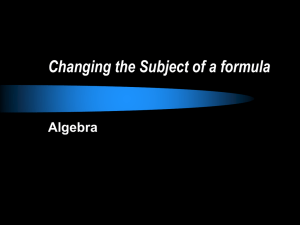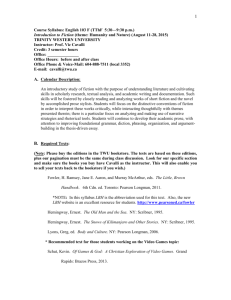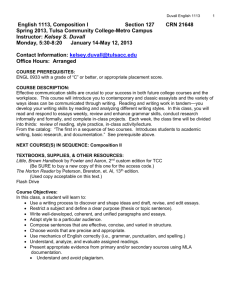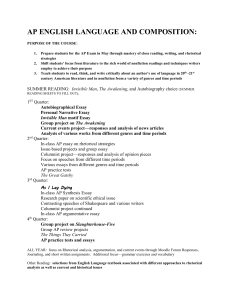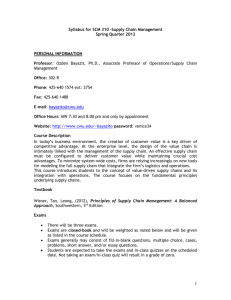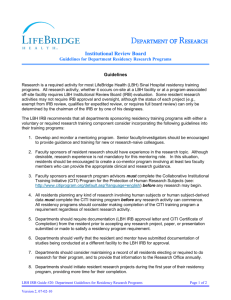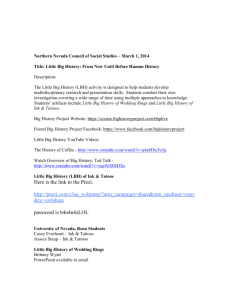ENG 101 College English Writing
advertisement
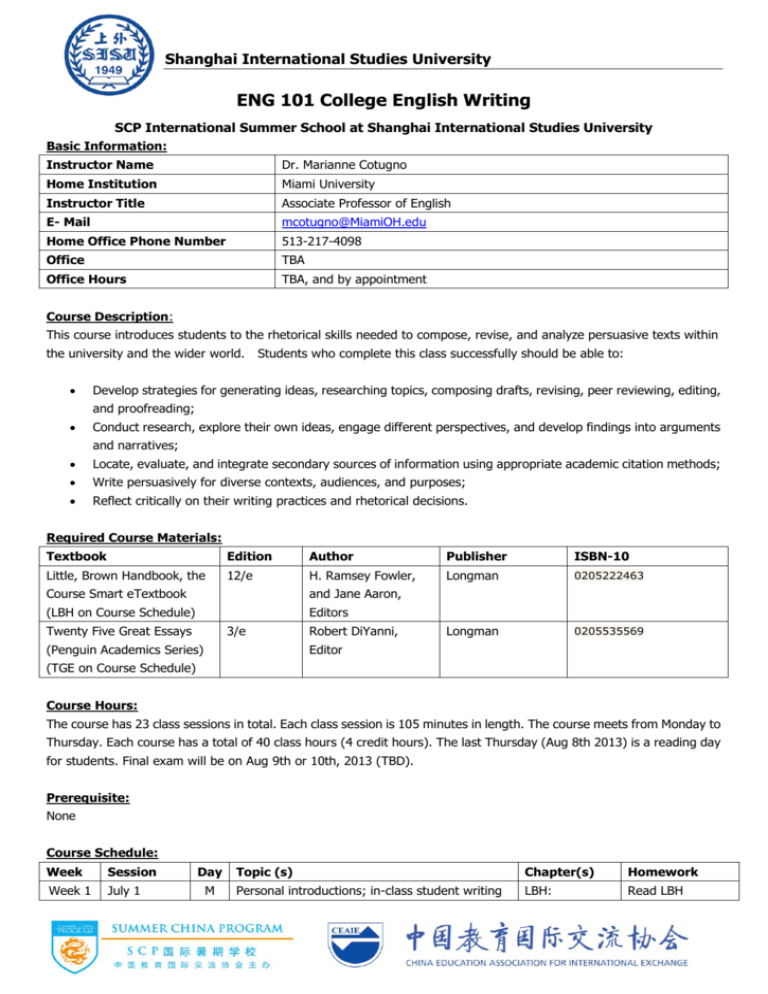
Shanghai International Studies University ENG 101 College English Writing SCP International Summer School at Shanghai International Studies University Basic Information: Instructor Name Dr. Marianne Cotugno Home Institution Miami University Instructor Title Associate Professor of English E- Mail mcotugno@MiamiOH.edu Home Office Phone Number 513-217-4098 Office TBA Office Hours TBA, and by appointment Course Description: This course introduces students to the rhetorical skills needed to compose, revise, and analyze persuasive texts within the university and the wider world. Students who complete this class successfully should be able to: Develop strategies for generating ideas, researching topics, composing drafts, revising, peer reviewing, editing, and proofreading; Conduct research, explore their own ideas, engage different perspectives, and develop findings into arguments and narratives; Locate, evaluate, and integrate secondary sources of information using appropriate academic citation methods; Write persuasively for diverse contexts, audiences, and purposes; Reflect critically on their writing practices and rhetorical decisions. Required Course Materials: Textbook Edition Author Publisher ISBN-10 Little, Brown Handbook, the 12/e H. Ramsey Fowler, Longman 0205222463 Longman 0205535569 Course Smart eTextbook and Jane Aaron, (LBH on Course Schedule) Editors Twenty Five Great Essays 3/e (Penguin Academics Series) Robert DiYanni, Editor (TGE on Course Schedule) Course Hours: The course has 23 class sessions in total. Each class session is 105 minutes in length. The course meets from Monday to Thursday. Each course has a total of 40 class hours (4 credit hours). The last Thursday (Aug 8th 2013) is a reading day for students. Final exam will be on Aug 9th or 10th, 2013 (TBD). Prerequisite: None Course Schedule: Week Session Week 1 July 1 Day M Topic (s) Chapter(s) Homework Personal introductions; in-class student writing LBH: Read LBH Shanghai International Studies University (diagnostic); explain syllabus, course policies, Introduction Chapters: 1, 2, 12 and written assignments Read TGE, Thurber, “University Days” July 2 Discuss Thurber, “University Days,” LBH 1, 2, 12 Read LBH TGE, Thurber Chapters: 3, 13 LBH 3, 13 Read LBH Review LBH, “Understanding Sentence Grammar” Assign Image/Text Narrative essay T In-class student writing exercise Review LBH, “Assessing the Writing Situation” and “Discovering and Shaping Ideas” July 3 Review LBH, “Drafting, Revising, Editing” Chapters: 14, 15, W Review LBH, “Case of Nouns and Pronouns” 16 In-class student writing exercise Read TGE, King, “Letter from In-class quiz July 4 Discuss King, “Letter…” Birmingham Jail” LBH Chapters: Read LBH 14, 15, 16 Chapters: 38 TGE, King, Read TGE, “Letter from Douglass, Birmingham “Learning to Read Jail” and Write” Review LBH, “Verbs,” “Agreement,” “Adjectives and Adverbs” Th In-class student writing exercise Prepare complete draft of Image/Text Narrative July 8 Review LBH, “Using Exact Language” LBH Chapters: Read LBH 38 Chapters: 23, 24 TGE, Douglass, Read TGE, Orwell, “Learning to “Shooting an Read and Elephant” Draft workshop for Image/Text Narrative Week 2 M Discuss Douglass, “Learning to Read and Write” Write” Shanghai International Studies University July 9 Discuss, TGE, Orwell, “Shooting an Elephant” LBH Chapters: Prepare revised 23, 24 Image/Text Review LBH, “Emphasizing Ideas,” “Using Coordination and Subordination” In-class quiz T Narrative TGE, Orwell, “Shooting an Draft Writer’s Elephant” Letter to Instructor for Preparing Writer’s Letter to Instructor for July 10 W Image/Text Image/Text Narrative Narrative Draft workshop for Image/Text Narrative and Prepare final copy Writer’s Letter to Instructor for Image/Text of Image/Text Narrative and Narrative Writer’s Letter to Instructor July 11 Collect Image/Text Narrative and Writer’s Read LBH Letter to Instructor Chapters: 6, 7, 8 Assign Rhetorical Analysis Essay Th Review Aristotle’s appeals: ethos, pathos, logos In-class student writing exercise July 15 Discuss LBH, “Forming a Critical Perspective,” LBH Chapters, Read LBH “Writing in Academic Situations,” “Reading 6, 7, 8 Chapters: 9, 25 Arguments Critically” M Read TGE, Swift, “A Modest In-class student writing exercise Proposal” In-class quiz on Aristotle’s Appeals Week 3 July 16 Assign Annotated Bibliography LBH Chapters: Read LBH 9, 25 Chapters: 41, 42 Discuss TGE, Swift, “A Modest Proposal” T Discuss LBH, “Writing an Argument,” “Using Parallelism” TGE, Swift, “A Modest Proposal” Shanghai International Studies University In-class student writing July 17 Creating an Annotated Bibliography LBH Chapters: Study to prepare 41, 42 for in-class Discuss “Planning a Research Project,” “Finding W midterm Sources” Review expectations for in-class midterm July 18 Prepare draft of In-class midterm Rhetorical Analysis essay Th Read TGE, Kingston, “On Discovery” July 22 Draft workshop for Rhetorical Analysis essay M TGE, Kingston, Read LBH “On Discovery” Chapters:26 Discuss TGE, Kingston, “On Discovery” Read TGE, Didion, “Marrying Absurd” July 23 T Students draft in-class: Writer’s Letter to LBH, Chapters: Revise Rhetorical Instructor for the Rhetorical Analysis Essay 26 Analysis essay Discuss TGE, Didion, “Marrying Absurd” TGE, Didion, Letter to “Marrying Instructor Discuss “Achieving Variety” Week 4 July 24 W and Writer’s Absurd” Draft workshop for Rhetorical Analysis essay Revise Rhetorical and Writer’s Letter to Instructor Analysis essay and Writer’s Letter to Instructor July 25 Th Collect Rhetorical Analysis and Writer’s Letter Read LBH to Instructor for Rhetorical Analysis Chapters: 43, 44 Review Annotated Bibliography expectations In-class student writing Week 5 July 29 M Review “Working with Sources” “Avoiding LBH Chapters: Prepare draft 43, 44 Annotated Shanghai International Studies University July 30 T Plagiarism and Documenting Sources” Bibliography In-class quiz on plagiarism and documenting Revise Annotated sources Bibliography Draft workshop for Annotated Bibliography Read LBH Chapters: 45, 46 July 31 LBH Chapters: Collect Annotated Bibliography 45, 46 Discuss “Writing the Paper” “Using MLA W August 1 Documentation and Format” Strategies for revising student writing: Revise Image/Text Narrative and Rhetorical Analysis Image/Text Th Narrative and Rhetorical Analysis August 5 In-class student revision work Revise Image/Text M Narrative and Rhetorical Analysis Week 6 August 6 August 7 August 8 T W Th Peer review of revised essays and in-class student revision work Course and Final Exam Review Study for final exam Reading day Final Exam Evaluation: The following table provides a brief outline of our major student learning outcomes, our activities, and our assessments. Activities help students develop the necessary skills to achieve student learning outcomes. Assessments provide students with the opportunity to demonstrate their mastery of student learning outcomes. Student Learning Outcomes Develop strategies for generating ideas, researching topics, composing drafts, revising, peer Activities 1. Read selections from textbooks Assessment Peer review of classmate’s paper Shanghai International Studies University reviewing, editing, and 2. Discuss selections from Midterm, short essay textbook guided by In-class quizzes professor Final exam, multiple proofreading; 3. In-class draft writing Conduct research, explore their 1. Read selections from own ideas, engage different perspectives, and develop findings into arguments and choice responses textbooks (LBH Student group presentation 2. Discuss selections from textbook guided by narratives; professor 3. In-class draft writing Locate, evaluate, and integrate 1. Read selections from secondary sources of information using appropriate academic citation methods textbooks In-class quiz Annotated bibliography Midterm, short essay Image/text narrative Rhetorical analysis essay Writer’s letters to 2. Discuss selections from textbook guided by professor 3. In-class draft writing Write persuasively for diverse 1. Read selections from contexts, audiences, and purposes; textbooks 2. Discuss selections from textbook guided by professor 3. In-class draft writing Reflect critically on their writing 1. Read selections from practices and rhetorical decisions. textbooks instructor 2. Discuss selections from textbook guided by professor 3. In-class draft writing Grading Policies: Part Percentage Points Image/Text Narrative and Writer’s Letter 15 100 + 50 Rhetorical Analysis and Writer’s Letter 15 100 + 50 Annotated Bibliography 5 50 Peer Reviews of Classmate’s Papers 5 50 10 100 Homework Quiz Assigned and “surprise” quizzes Exams Final exam, short essay Shanghai International Studies University Midterm 15 150 Final 15 150 In-class discussion and participation 20 200 Course Total 100% 1000 Points Attendance/ Participation Grade Distribution: Percentage Letter Grade Grade Points 93-100 A 4.0 90-92 A- 3.7 87-89 B+ 3.3 84-86 B 3.0 81-83 B- 2.7 78-80 C+ 2.3 75-77 C 2.0 72-74 C- 1.7 69-71 D+ 1.3 66-68 D 1.0 65 and below F 0.0 Written Work and Exam Policy All required written work is due by the start of class on the day it is listed to be submitted. No late work will be accepted unless prior arrangements have been made with the instructor, or if an extraordinary situation arises that prevents the student from submitting work on time. Late penalties may be applied to work that is accepted late. A midterm and a final exam will be given in class. It is at the instructor’s discretion whether a make-up exam will be given for students. Academic Integrity SCP expects honesty from students in presenting all of their academic work. Students are responsible for knowing and observing accepted principles of scholarly research and writing in all academic work. Academic dishonesty or cheating includes acts of plagiarism, forgery, fabrication or misrepresentation, such as the following: claiming the work or thoughts of others as your own copying the writing of others into your written work without appropriate attribution writing papers for other students or allowing them to submit your work as their own buying papers and turning them in as your own having someone else write or create all or part of the content of your assignments submitting the same paper for more than one study or class without explicit permission from the faculty members Shanghai International Studies University General Principles SCP is committed to principles of trust, accountability, clear expectations and consequences. It is also committed to redemptive efforts, which are meaningful only in light of these principles. Students will be granted due process and the opportunity for an appeal. Academic dishonesty offenses generally are subject to incremental disciplinary actions. Some first offenses, however, receive severe penalties, including dismissal from the program. General Disciplinary The following is a non-comprehensive list of possible actions apart from dismissal from the program: warning from a professor, program director; a lower or failing grade on an assignment, test or course; suspension or dismissal from the course; suspension or dismissal from the program. Disciplinary Actions for Specific Offenses Some academic dishonesty offenses call for specific disciplinary actions. The following have been identified: Falsification of documents: Students who falsify or present falsified documents may be dismissed. Prospective students who are discovered to have presented falsified admission documents prior to admission shall be denied admission to the program. Should it be discovered after admission that a student had presented falsified documents for admission, such admission may be annulled and the record of academic achievement removed from the academic record, with appropriate notations. Such annulments or denials may be reviewed after one year. Dishonesty in course requirements: Course work (a quiz, assignment, report, mid-term examination, research paper, etc.) in which a student has been dishonest generally will receive zero points towards the grade in fulfillment of a course requirement, and/or the student may receive a failing grade for the course. The professor of the course determines the appropriate consequence. Final assignment: When a student cheats in a major or final assignment such as a comprehensive examination or presents plagiarized material in a major or final assignment, that student shall receive an F in that particular subject. Student cheats on more than two exams shall be dismissed from SCP.

